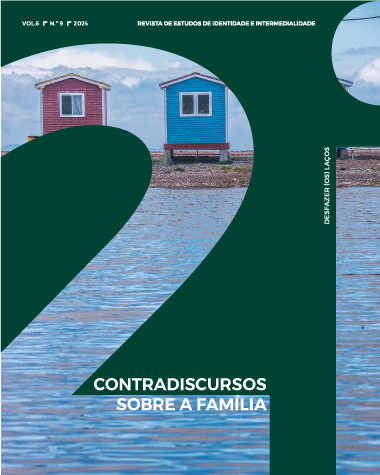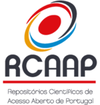El efecto 'queer' de las genealogías matrilineales en 'Todo sobre my madre' (1999) de Pedro Almodóvar
DOI:
https://doi.org/10.21814/2i.5589Palavras-chave:
la maternidad, los estudios de género, el cine españolResumo
¿Cómo se comienzan las formaciones alternativas de parentesco a cuestionar las estructuras familiares heteronormativas y patriarcales? Las genealogías matrilineales no están sujetas a las limitaciones de los linajes patriarcales. No necesariamente se basan únicamente en conexiones biológicas entre miembros de la familia, ni reproducen estructuras familiares edípicas ni nucleares tradicionales. La inclusión de figuras maternas sustitutas en las genealogías matrilineales señala el potencial anti-heteronormativo de los parentescos alternativos formados a través de redes formales o improvisadas de mujeres. Estas figuras cuestionan las limitaciones de la categoría madre, planteando los límites del término al operar tanto dentro como fuera de las nociones patriarcales de la maternidad. La película Todo sobre mi madre (1999) de Pedro Almodóvar me sirve como punto de partida para investigar las genealogías matrilineales que adquieren una calidad espontánea e improvisada en lugar de reflejar una estructura familiar normativa, incorporando amigos, amantes e incluso desconocidos. La solidaridad matrifocal de la película indica el poder subversivo y utópico de caminar juntos. Este trabajo comienza considerando la idea de la maternidad queer y luego analiza cómo Manuela, como madre sin hijo, Manuela, como madre sustituta, y Lola, como padre transgénero, problematizan la noción de familia y el concepto de madre.
Downloads
Referências
Acevedo-Muñoz, E. (2004). The body and Spain: Pedro Almodóvar’s All About My Mother.
International journal of phytoremediation, 21(1), 25–38.
https://doi.org/10.1080/10509200490262433
Almodóvar, P. (Writer/Director) & Almodóvar, A. (Producer). (1999). Todo sobre mi madre
[Motion picture]. Culver City: Sony Pictures Classics.
Butler, J. (2006). Gender trouble: Feminism and the subversion of identity. Florence:
Routledge.
Chodorow, N. (1999). The reproduction of mothering: Psychoanalysis and the sociology of
gender. Berkeley: University of California Press.
Gibson, M. (2014). Introduction: Queering motherhood in narrative, theory, and the everyday.
In Queering motherhood: Narrative and theoretical perspectives (pp. 1-23). Bradford: Demeter Press.
Gutiérrez-Albilla, J. D. (2017). Aesthetics, ethics and trauma in the cinema of Pedro
Almodóvar. Edinburgh: Edinburgh University Press.
Hansen, E. T. (2021). A sketch in progress: Introducing the mother without child. In Maternal
theory: The essential readings (pp. 223-249). Bradford: Demeter Press.
Eggert, V. Z. (2014). Authentic monsters and artificial mothers: Maternal Frustration in Pedro
Almodóvar’s All About My Mother. Literature film quarterly, 42(1), 386–397. https://link.gale.com/apps/doc/A364661423/LitRC?u=ucriverside&sid=summon&xid=9e42ddcb
Estés, C. P. (1992). Women who run with the wolves: Myths and stories of the wild woman
archetype. New York: Ballantine Books.
Estrada, L. (2014). ‘La potencia de lo falso’ en Todo sobre mi madre (1999) de Pedro
Almodóvar. Hispanic Research Journal, 15(6), 530–546. https://doi.org/10.1179/1468273714Z.000000000105
Fraiman, S. (2017). Extreme domesticity: A view from the margins. New York: Columbia
University Press.
GQSpain. (2019, December 18). Pedro Almodóvar: mis mejores películas. Youtube.
https://www.youtube.com/watch?v=-Vl9nv_KBmE.
Hirsch, M. (1989). The mother/daughter plot: Narrative, psychoanalysis, feminism.
Bloomington: Indiana University Press.
Irigaray, L. (1993) Sexes and genealogies. New York: Columbia University Press.
James, S. M. (1993). Mothering: A possible Black feminist link to social transformation. In
Theorizing Black feminisms: The visionary pragmatism of Black women (pp. 45-54). London: Routledge.
Maurer Queipo, I. (2011). Cruzando fronteras: Todo sobre mi madre (1999) de Pedro
Almodóvar. Revista de comunicación de la SEECI, Año XV (24), 18–34.
https://doi.org/10.15198/seeci.2011.24.18-34
Morcillo, A. G. (2008). True catholic womanhood: Gender ideology in Franco’s Spain. DeKalb:
Northern Illinois University Press.
Rich, A. (1976). Of woman born: Motherhood as experience and institution (1st ed.). New York:
Norton.
Smith, P. J. (2014). Desire unlimited: The cinema of Pedro Almodóvar. New York: Verso.
Strauss, F. & Almodóvar, P. (2006). Almodóvar on Almodóvar. London: Faber.
Warner, M. (Ed.). (1993). Fear of a queer planet: Queer politics and social theory (1st ed.).
Minneapolis: University of Minnesota Press.
Downloads
Publicado
Versões
- 2024-06-24 (3)
- 2024-06-24 (2)
- 2024-06-23 (1)
Como Citar
Edição
Secção
Licença
Direitos de Autor (c) 2024 McKenna Middleton

Este trabalho encontra-se publicado com a Creative Commons Atribuição-NãoComercial 4.0.


.jpg)










